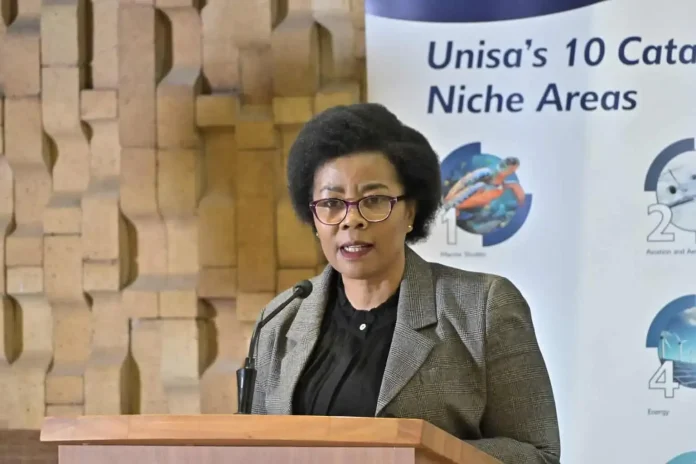
As published by Nancy Legodi in the African Times
University of South Africa Vice Chancellor, Professor Puleng LenkaBula, has challenged academics, policymakers, and industry leaders to reflect on the role of education in combating poverty and underdevelopment amid digitisation and shifting geopolitics.
Become an insider. Subscribe to our newsletter for more top trending stories like this!
She also called for strategic, innovative and collaborative leadership in the higher education sector in the face of growing challenges, including the financing of the sector and global trade restrictions.
LenkaBula recently addressed the Catalytic Niche Area (CNAs) Research Symposium at the university’s main campus, Muckleneuk, in Pretoria.
Themed “Innovating for the Future: Integrating Technology, Sustainability, and Humanity,” the gathering brought together academics, industry leaders, and policymakers to discuss practical, research-driven solutions to some of the world’s most critical challenges.
Delivering the welcome address on the opening day, Lenka Bula appreciated the fact that the catalytic niche areas are becoming central to how Unisa is envisioned, to its scientific agenda, and to its contribution to national, continental, and global developments for the betterment of societies.

LenkaBula said: “We also need to ask ourselves what the value of education is, especially in higher education and in the context of the shifting geopolitical context and digitisation, including where people live in poverty and with underdeveloped systems.”
LenkaBula implored those attending the symposium to reflect on how the catalytic niche areas have shaped UNISA’s direction since her tenure as Vice Chancellor began in 2021.
“I once stated that my intentions as a leader at Unisa are not just to bring new ideas, but to reaffirm the university’s excellence in the areas of teaching and learning, research and innovation, and engaged scholarship, as well as the global impact of the institution, which the CNAs support,” LenkaBula added.
The Unisa leader reminded her audience that the institution was one of the few functional universities during the Covid-19 pandemic, despite the unprecedented challenges it brought.
Lauding the leaders in Unisa’s research portfolio, LenkaBula noted: “I appreciate that you saw the importance of institutionalising research that supports the CNAs. These areas contribute to rethinking and reclaiming Africa’s futures.”
She further acknowledged that the symposium takes place against the backdrop of challenges within the higher education sector, including the financing of the sector and global trade restrictions.

According to LenkaBula, these challenges provide opportunities for universities to consider relevant and impactful solutions.
“Unisa’s roots are embedded in African knowledge, social justice and academic excellence, enabling us to remain steady, even as we navigate the shifting global dynamics,” She said. “Our responses must be strategic, innovative and collaborative.”
Become an insider. Subscribe to our newsletter for more top trending stories like this!
Mapipa also serves as the Executive Manager of the Marketing and Communication Portfolio at the Association of Women Managers in the Maritime Sector in Eastern and Southern Africa.
She shared that MKRI integrates evidence-based research, policy support, skills development and innovation facilitation to promote economic growth, especially in KwaZulu-Natal (KZN), where the institute is located.
“Through coordinated programmes, research funding and collaboration, the institute strengthens local research capacity while aligning with provincial priorities to drive inclusive development,” added Mapipa.
Mapipa stated that the maritime sector is at a crossroads; therefore, digital transformation, climate commitments and global competition demand the reimagination of how the sector operates.
“Future-proofing is urgent as climate commitments require emission-free shipping, and global competition is increasing through smart ports,” Mapipa said.

She added: “Digital disruption is also reshaping how maritime business is done, and South Africa’s unemployed youth must be included in transformation.”
Mapipa further highlighted the major human capital gaps in the maritime sector, including outdated training curricula, a shortage of hybrid skills, limited representation of women and youth, especially in technical and leadership positions, and a lack of compliance training.
She also shared some skills development solutions for the sector, which include curriculum modernisation, improving workplace-based learning, enhancing partnerships and benchmarking.
“I recommend the upskilling of maritime educators, establishing maritime skills innovation hubs with simulation-based learning, and incentivising inclusion through scholarship for women and youth.”
This article has been published in partnership with the African Times.
Become an insider. Subscribe to our newsletter for more top trending stories like this!




